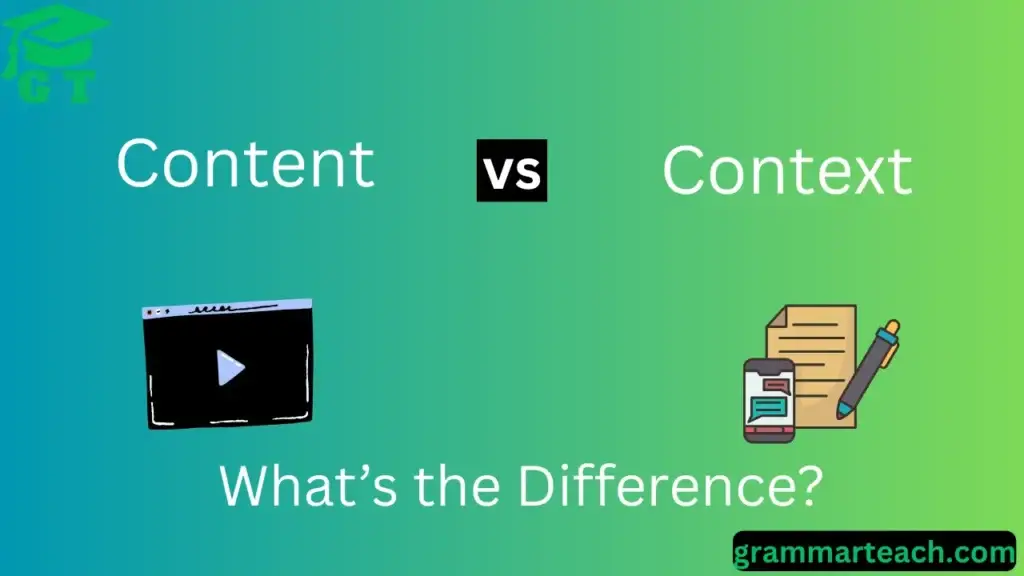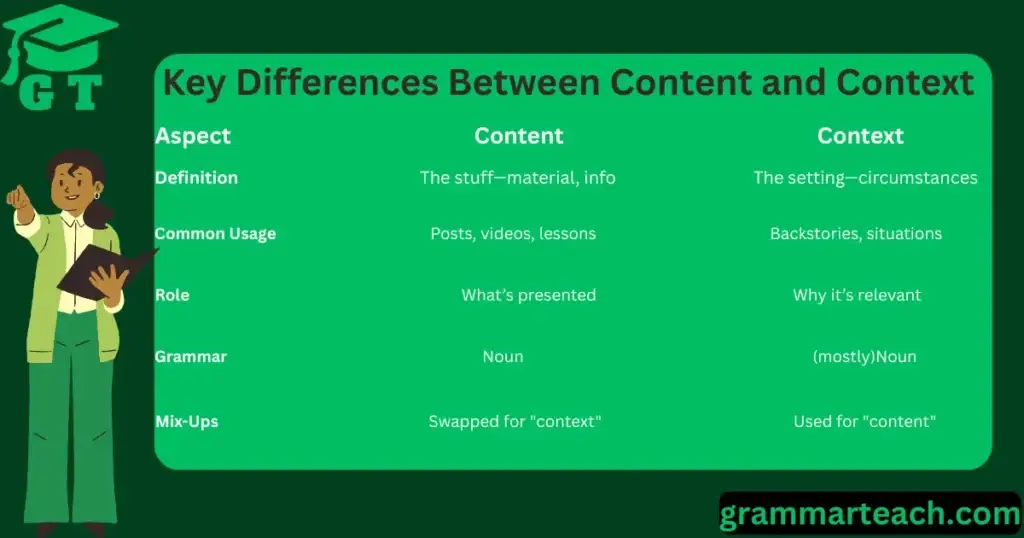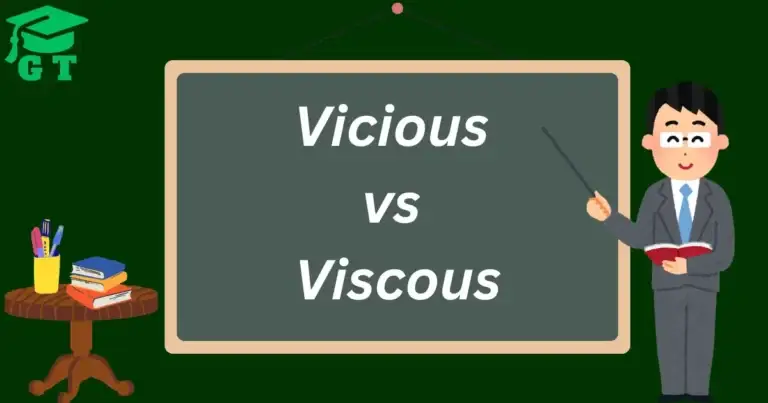Ever caught yourself second-guessing whether “content” or “context” fits your sentence? It’s a common stumble—two words that sound alike, hover around meaning, and yet couldn’t be further apart in purpose. The content vs context dilemma trips up everyone from students scribbling essays to marketers crafting campaigns, and it’s no wonder: they’re deceptively similar at a glance. But here’s the truth: one’s about the “what,” the other’s about the “why.” In this article, we’re zeroing in on that difference, breaking it down so you’ll never mix them up again—whether you’re texting a friend or polishing a professional piece.
Why does content vs context matter? Because using the wrong one can muddle your message, leaving readers scratching their heads instead of nodding along. This guide will unpack their meanings, spotlight their differences, and toss in real-life examples to make it stick. We’ll explore how content fills the page and context frames it, with a comparison table, practical tips, and more—all tailored to help you wield these words like a pro. Ready to conquer the content vs context confusion? Let’s dive in!
Content vs Context – What’s the Difference?

At its heart, the content vs context distinction is straightforward. Content is the stuff—the material, info, or substance you’re dealing with, like the text in an article or the scenes in a video. Context is the setting—the circumstances or background that give that stuff its meaning. People mix up content vs context because both tie into how we communicate, but they’re like two sides of a coin: one delivers, the other explains. Let’s dig deeper with their origins and slip-ups.
A Quick Peek at Origins
- Content: From Latin contentum (“that which is contained”), it’s all about what’s held inside—words, images, ideas.
- Context: From contexere (“to weave together”), it’s the web of details that connect the dots.
Common Mistakes: Ever heard someone say, “The context of this blog is great,” when they meant the content—the posts themselves? Or “Check the content” when they needed the backstory (context)? These flubs blur the content vs context line, but we’ll sharpen it up.
What Is Content?
Definition: Content is the “what”—the tangible or intangible material inside something. It’s the words in a book, the footage in a reel, the data in a spreadsheet.
Usage in Sentences:
- “The content of this email is urgent—read it now.”
- “Her blog’s content keeps me hooked every week.”
- “The course content covers coding basics.”
Contextual Usage: Content thrives across settings—casual (“Cool content, bro!”), digital (“We need fresh website content”), and formal (“The content of this contract is binding”). It’s usually a noun, though the verb form (“to content oneself”) pops up rarely, meaning to satisfy. Today, content is a darling of the online world—think “content creators” churning out videos or posts. In the content vs context debate, it’s the star of the show, the thing you consume.
Why It’s Key: Content drives engagement. Weak content flops; strong content captivates. Mixing it with context waters down its punch.
What Is Context?
Definition: Context is the “why” and “where”—the situation or framework that surrounds the content, making it make sense. It’s the backstory, the vibe, the lens.
Usage in Sentences:
- “In the context of last year’s chaos, this decision was smart.”
- “What’s the context behind his outburst?”
- “The quote needs context to hit home.”
Contextual Usage: Context flexes in formal zones (like essays needing historical context) and casual ones (“Give me the context, quick”). It’s a noun that leans on relationships—always linking to something else, like an event or idea. In the content vs context showdown, context plays support, illuminating why the content matters. Think of it as the stage for the content’s performance.
Why It’s Key: Context prevents confusion. Strip it away, and content feels like a puzzle with missing pieces—intriguing but incomplete.
Read More: Plural of Syllabus: Syllabi or Syllabuses? Easy Guide
Key Differences Between Content and Context

Here’s a clear content vs context breakdown:
| Aspect | Content | Context |
| Definition | The stuff—material, info | The setting—circumstances |
| Common Usage | Posts, videos, lessons | Backstories, situations |
| Role | What’s presented | Why it’s relevant |
| Grammar | Noun (mostly) | Noun |
| Mix-Ups | Swapped for “context” | Used for “content” |
In the content vs context clash, content is the cargo; context is the map showing where it’s headed.
Example Scenarios to Illustrate Content vs Context
- Blog Post:
- Content: A 700-word guide on baking bread.
- Context: Posted during a flour shortage—now you see why it’s timely.
- Meeting Notes:
- Content: A list of action items from a team huddle.
- Context: Jotted down after a client’s big complaint—suddenly, the urgency clicks.
- Movie Review:
- Content: A recap of the plot and cast.
- Context: Written during a blockbuster season—explains the hype.
- Text Message:
- Content: “I can’t do this anymore.”
- Context: Sent after a grueling workweek—without that, it’s just cryptic.
These snippets spotlight content vs context in action—one’s the goods, the other’s the glue.
Why Do People Confuse Content vs Context?
The content vs context tangle has roots:
- Sound-Alikes: Both kick off with “con” and flow similarly—easy to slur together.
- Meaning Overlap: They’re both about understanding, just from different angles.
- Fuzzy Boundaries: Without examples, content vs context feels abstract.
- Modern Twists: Content’s digital boom (e.g., “social media content”) sometimes blurs its edge with context.
It’s a linguistic speed bump, but one we can smooth out with practice.
Synonyms & Antonyms
| Word | Synonyms | Antonyms |
| Content | Stuff, material, info | Nothingness, vacancy |
| Context | Setting, backdrop, frame | Disconnect, void |
Which One Should You Use? (Practical Tips for Writers)
Stuck on content vs context? Try this:
- Go with “content” for the meat—what’s being said or shown. E.g., “The content of this ad is bold.”
- Opt for “context” for the frame—why it fits or what surrounds it. E.g., “In this context, it’s brilliant.”
- Test It: Swap them in your sentence. Meaning shift? You’ve got the wrong one.
- Cheat Code: Think “content = contained,” “context = connected.”
In the content vs context game, precision matters. A marketer might say, “Our content grabs eyes, but the context of the campaign seals the deal.” Nail both, and you’re golden.
Read More: Grateful vs Greatful: Which Is Right? Easy Guide!
Final Thoughts
So, content vs context? Content is the what—the info or material you’re dishing out. Context is the why—the setup that makes it sing. The content vs context divide isn’t just wordplay; it’s the difference between a flat message and a sharp one. Whether you’re blogging, chatting, or briefing, picking the right term keeps your ideas crisp and your audience tuned in.
Next time you write, ask: Is this content I’m sharing or context I’m setting? Get it right, and watch your words work harder. Still wrestling with content and context? Tell us your trickiest moment below!




